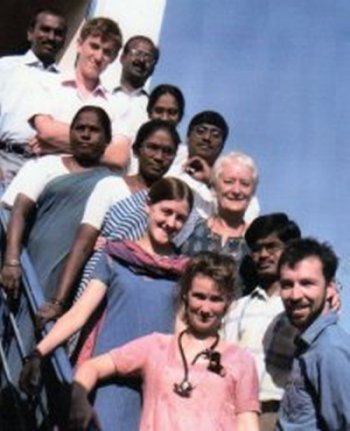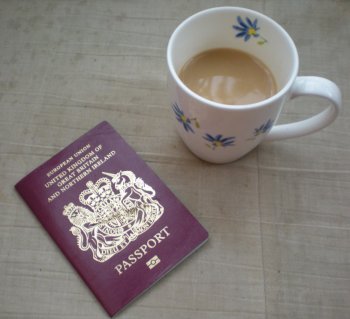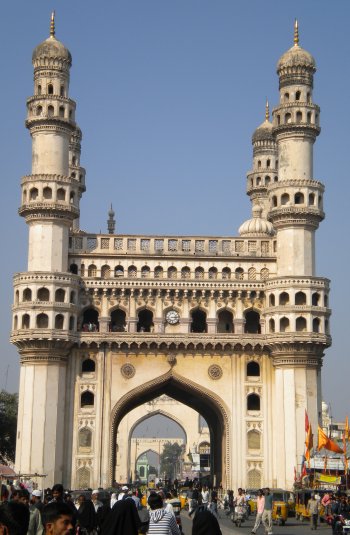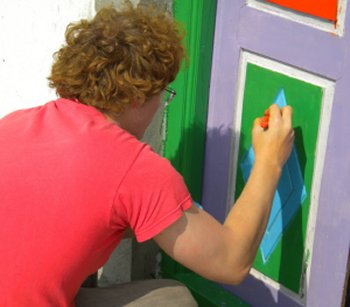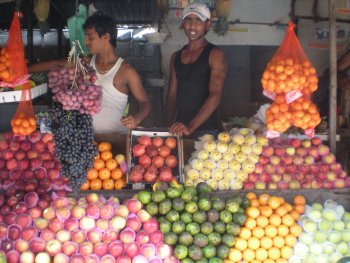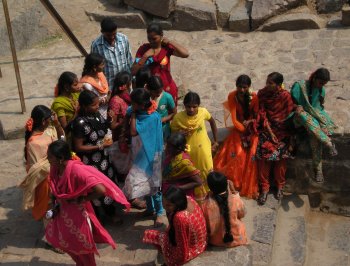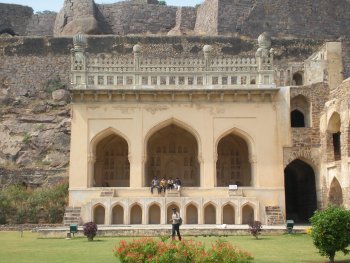Practical
Information
If you have
any questions that are not answered here or queries about what is written,
please contact us. For issues that relate to India in general, guidebooks
such as 'Lonely Planet' or 'Rough Guide' provide reasonably up to date
and accurate information.
In the village
The working week at the clinic is from 8 am Monday morning until Friday
after lunch. Volunteers may take a train to the village on Monday mornings
at 8 am and return on Friday afternoon by bus. Most of the time volunteers
travel to and from the villages by train or by bus. Saturday morning
is chance for volunteers to coordinate with city staff, go over referral
cases and review the week at the clinic. Some teaching is also appreciated
by the city-based counsellors.
In Hyderabad
Volunteers based in the city work 9 to 5 Monday to Friday and Saturday
morning.
Visas
Visas are obtained from the Indian High Commission in the capital city
of your country. You should state that you are coming as a tourist.
Foreigners are not permitted to work for pay in India. A visa is valid
for 6 months and begins the date the visa is issued. Getting a visa
extended is difficult.
If the High Commission ask for a contact in India you can use the name
and personal address of the director of the IRHS (Dr Pat Bidinger, 703
Mount Kailash, Road 4, Banjara Hills, Hyderabad 500 034). Otherwise,
use the IRHS post office box as an address (PO Box 50, Banjara Hills,
Hyderabad 500 034, India).
Getting to Hyderabad
Hyderabad, the capital of Telangana, has good road, rail and air links
to India's major cities. It has many international flights.
We recommend that volunteers fly directly to Hyderabad so that the Institute
and its staff can cushion their introduction to the country. The first
time visitor to India can be put off balance by the abject poverty and
enormous cultural difference from their home country.
Rail
Travelling to Hyderabad by rail offers a way of seeing some of the country
en route and the chance to visit some interesting places on the way.
Mumbai (Bombay) to Hyderabad takes 15 hours. This way of getting to
Hyderabad can be fun but it may feel like hard work for the newcomer.
Air
It is possible to organise air travel direct to Hyderabad. The options
for air travel from outside the country are very changeable so shopping
around is the best way to get what you want. There are many domestic
flights within India so it is easy to fly to Hyderabad from India's
main cities.
Getting Away
After completing their time with the IRHS, many volunteers take the
opportunity to travel in India before returning home. Our director is
happy to offer travel tips, as she has a wealth of experience of travelling
in India.
Insurance
You may feel comfortable obtaining your own health and travel insurance.
Theft is uncommon here. Medical care in Hyderabad can be comparable
to that in a Western country for all but the most complex conditions.
We cover short-term health care expenses (but not pre-existing ones).
Visas
For British nationals, we recommend that you visit the Indian High Commision
website which provides full details on how to obtain a Tourist visa
via mail; !!!!!!!!!!!!!!!!!!!!!!!!
Vaccinations
Check with your doctor or travel clinic regarding vaccinations for India.
We recommend all the usual ones taken by Western children for travel
in India. Update your tetanus, typhoid and hepatitis vaccinations. Rabies
vaccination is not essential. Volunteers are at low risk for malaria.
Money and subsistence
We have very little money, but we do provide housing and funds for travel
to the village, and food at the weekends for medical volunteers. At
the village food is provided "at home". Volunteers based in
Hyderabad are given funds to buy all their food. Volunteers are only
asked to pay their own airfare and ground transportation to Hyderabad
and meet their personal expenses.
Currency
The currency of India is the Rupee. Whenever you change money take your
time, count all the money and do not accept notes that are utterly disintegrated
or dirty as they may be difficult to exchange. Try to keep a supply
of smaller denominations as traders often do not have a lot of change.
Any major credit card with a 'pin' can be used to obtain cash from local
ATMs. Some local ATM's charge foreign credit cards for cash withdrawals;
however by law they have to inform you before you can take your money.
So be careful and read all the information before you accept your cash!
Accommodation
In the village volunteers have their own small house with a western
toilet and shower.
In Hyderabad, our office is in a flat located in a residential area
of Banjara Hills. Volunteers have their own room with an attached bathroom,
and use of the flat's kitchen. The front hall resembles any normal sitting
room, and the actual office area is tucked away behind a furniture divide.
Clothing
Living and working in India requires a degree of cultural sensitivity.
Wearing shorts and a t-shirt will have a negative impact on local people
and the way they react to you, and this is important. Generally, if
you dress in a fairly conservative manner you will be respected more
than if your appearance is very casual. One or two "smart"
outfits should be brought for visits to hospitals and fancier dinners
in Hyderabad. Throughout the year the temperature is warm so cotton
clothing is more comfortable than polyester.
Men
Our staff and virtually all Indians are extremely well groomed and appreciate
it if our volunteers are too. This means that men should have hair neatly
trimmed and shave daily unless they have a beard. Men may wear western
style trousers and shirts while working in the village clinics or in
Hyderabad. After work more casual dress can be worn including a lungi
which is similar to a sarong.
Women
In the village women will be most comfortable in a salwar kameez, a
loose tunic top over draw-string trousers. In the city a blouse and
skirt or jeans can be worn. Salwar kameez can be easily bought on arrival
in Hyderabad at reasonable cost.
What to bring, essential items
Other
useful items
Toiletries
and tampons (OB) are readily available but you may not be able to find
particular brands. A modest first aid kit is only necessary if you are
travelling within India before or after your stay. The clinics have
most common medicines (about 80). Local pharmacies have nearly everything
one would find in the West - all available without a prescription and
at very inexpensive prices.
Shopping
Within walking distance of the IRHS office and living quarters there
are numerous grocery stores. Fruit shops abound with an array of tasty
seasonal fruits: grapes, oranges, papaya, mangos, guavas, bananas.
Eating out
There is a great variety of restaurants in Hyderabad offering a vast
range of food. Volunteers can also order takeaways (called 'parcels')
from many restaurants. It is very easy to find restaurants and order
takeaways using any of the modern apps or websites such as Zomato, Swiggy,
Tiny Owl and Tinmen. Some good examples of restaurants close to IRHS
are; Rock Castle, Lamma Khan (mainly for lunches and snacks), Hyderabad
Goes Green (local and organic cuisine) and Four Seasons.
Local Transport
Three-wheelers or auto rickshaws provide cheap transport and are readily
available, the minimum fare is Rs.20 and after the first 1.6km it is
Rs.11 per km. If you don't want to barter with auto drivers you can
easily book a taxi with Ola or Uber (Rs.9 per km) if you download one
of the apps. However, the cheapest way to travel is by bus. There is
a regular and very cheap bus service in Hyderabad and you can check
the times online or by using Google maps.
|
|
